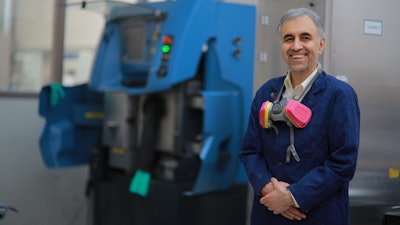
An engineering professor at The University of Toledo who was the first to make 3D objects with smart materials that can change form while retaining similar atomic structure, then snap back to their original shape when activated by heat is getting millions in federal funding to apply his expertise toward next-generation medical devices, airplanes and drones.
Dr. Mohammad Elahinia, Distinguished University Professor, director of the Institute for Applied Engineering Research and chair of the UToledo Department of Mechanical, Industrial and Manufacturing Engineering, has received $2.5 million to collaborate with the U.S. Department of Energy’s Oak Ridge National Laboratory on a U.S. Department of Defense project to develop high-temperature shape memory alloys for 3D printing of advanced defense and aerospace functional components that could lead to smaller, lighter aircraft.
Shape memory alloys are critical for actuators used in medicine, defense, aerospace and automotive applications. Actuators are the components of a machine that control motion, like the mechanisms that trigger anti-lock brakes, open a valve or help a prosthetic limb move.
3D printing, in which you build a 3D shape by adding layer upon layer of a material, is officially known as additive manufacturing.
“We started research on additive manufacturing of shape memory alloys 10 years ago,” Elahinia said. “Since that time, both additive manufacturing technology and processing of shape memory alloys advanced. However, several key technical challenges remain in this field, including new shape memory alloy development designed for additive manufacturing. This funding gives us a unique opportunity to solve these existing challenges.”
Traditional shape memory alloy actuation systems are based on simple geometries. The objective of this project is to develop the materials and manufacturing processes to rapidly manufacture complex shape memory alloy geometries.
“Since the dawn of flight, Ohio has been a leader in testing the boundaries of what is possible,” said Congresswoman Marcy Kaptur. “This federal funding for The University of Toledo’s cutting-edge technological advancements will propel us even further, and we congratulate Dr. Elahinia and the entire team for their work to secure this award.”
UToledo’s breakthrough several years ago with high-temperature shape memory alloys enables faster and more powerful actuation, opening the door for possibilities such as replacing the heavy, noisy hydraulic systems in the wings of fighter jets, drones and commercial airplanes with lighter, less costly actuators.
“This grant is providing critical momentum to support the development of the additive manufacturing technology ecosystem that we are building at UToledo, which enables us to more effectively engage in translational research programs to serve defense, aerospace and automotive industries and their research-and-development needs,” said Dr. Behrang Poorganji, a research professor and the advanced manufacturing director of the Institute of Applied Engineering Research, who also is leading the project.
“I’m excited about the partnership with The University of Toledo that is focused on additive manufacturing of advanced shape memory alloys,” said Dr. Lonnie Love, a corporate fellow and section head for precision manufacturing and machining at Oak Ridge National Laboratory. “Oak Ridge National Laboratory’s leadership in advanced manufacturing at the Manufacturing Demonstration Facility coupled with The University of Toledo’s expertise in shape memory alloys will help advance the science in smart actuators.”






















